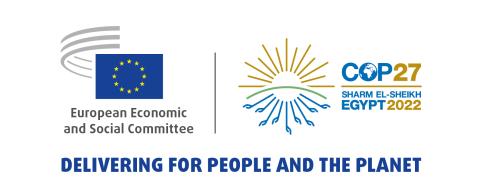European Economic
and Social Committee
Breadcrumb
- Home
- Documents
- Resolution
- Current: EESC Resolution: Jointly tackling an existential threat - social partners and civil society for the implementation of ambitious climate action
EESC Resolution: Jointly tackling an existential threat - social partners and civil society for the implementation of ambitious climate action
Document type
Resolution
Latest update
Key messages
The European Economic and Social Committee:
- stresses that we are living through a climate emergency and is deeply convinced that policy decisions need to respond to science and scientific information; and calls on the European Commission and the EU Member States to take a leadership role and to update the nationally determined contribution (NDC) following the Glasgow Climate Pact;
- acknowledges that Russia's invasion of Ukraine has added complexity to an already difficult situation, but stresses that exceptional derogations to agreed targets can only be granted for a limited time;
- is convinced that the European Green Deal needs to be strengthened and calls to intensify EU diplomacy efforts on promoting the adoption of European Green Deal-like policy frameworks by the international community;
- calls for an increase in total climate finance contributions by developed countries, with "equal emphasis" on financing mitigation and adaptation, and urges the EU Member States and the Commission to commit to the "loss and damage facility" in order to repair the consequences of climate change;
- believes that the NDCs should be accompanied by national job plans and just transition strategies; calls for empowering civil society to accelerate climate action, proposing a new governance framework to develop these transformational changes; and encourages governments and regional authorities to create Just Transition Commissions to address the social challenges of the green transformation.
Downloads
Work organisation
Related policies
Related events
